Deploy zookeeper
Node 128 129 130
- Install jdk before deployment
Portal: zookeeper3.4.14
[root@ceshi-128 local]# java -version java version "1.8.0_221" Java(TM) SE Runtime Environment (build 1.8.0_221-b11) Java HotSpot(TM) 64-Bit Server VM (build 25.221-b11, mixed mode)
Download and configure
[root@ceshi-128 ~]# tar -xf zookeeper-3.4.14.tar.gz -C /usr/local/ [root@ceshi-128 ~]# cd /usr/local/ [root@ceshi-128 local]# ln -s /usr/local/zookeeper-3.4.14/ /usr/local/zookeeper [root@ceshi-128 conf]# pwd /usr/local/zookeeper/conf [root@ceshi-128 conf]# cp zoo_sample.cfg zoo.cfg configuration parameter [root@ceshi-128 conf]# vi zoo.cfg # The number of milliseconds of each tick tickTime=2000 # The number of ticks that the initial # synchronization phase can take initLimit=10 # The number of ticks that can pass between # sending a request and getting an acknowledgement syncLimit=5 # the directory where the snapshot is stored. # do not use /tmp for storage, /tmp here is just # example sakes. dataDir=/data/zookeeper/data dataLogDir=/data/zookeeper/logs # the port at which the clients will connect clientPort=2181 server.1=zk1.od.com:2888:3888 server.2=zk2.od.com:2888:3888 server.3=zk3.od.com:2888:3888 [root@ceshi-128 conf]# mkdir -p /data/zookeeper/data [root@ceshi-128 conf]# mkdir -p /data/zookeeper/logs
Add DNS OD com. The above domain name can be resolved successfully
Configure cluster myid
[root@ceshi-128 conf]# vi /data/zookeeper/data/myid 1 [root@ceshi-129 conf]# vi /data/zookeeper/data/myid 2 [root@ceshi-130 conf]# vi /data/zookeeper/data/myid 3 [root@ceshi-128 bin]# /usr/local/zookeeper/bin/zkServer.sh start ZooKeeper JMX enabled by default Using config: /usr/local/zookeeper/bin/../conf/zoo.cfg Starting zookeeper ... STARTED [root@ceshi-128 bin]# netstat -tnlp | grep 2181 tcp 0 0 0.0.0.0:2181 0.0.0.0:* LISTEN 55304/java 130 Node is master [root@ceshi-130 bin]# ./zkServer.sh status ZooKeeper JMX enabled by default Using config: /usr/local/zookeeper/bin/../conf/zoo.cfg Mode: leader
Deploy jenkins to k8s cluster
Mirror portal: dockerhub
Node 132
[root@ceshi-132 ~]# docker pull jenkins/jenkins:v2.222.4 2.263.4: Pulling from jenkins/jenkins 9a0b0ce99936: Pull complete db3b6004c61a: Pull complete 4e96cf3bdc20: Pull complete e47bd954be8f: Pull complete b2d9d6b1cd91: Pull complete fa537a81cda1: Pull complete Digest: sha256:64576b8bd0a7f5c8ca275f4926224c29e7aa3f3167923644ec1243cd23d611f3 Status: Downloaded newer image for jenkins/jenkins:v2.222.4 docker.io/jenkins/jenkins:v2.222.4 [root@ceshi-132 ~]# docker tag 22b8b9a84dbe harbor.od.com/public/jenkins:v2.222.4 [root@ceshi-132 ~]# docker push harbor.od.com/public/jenkins:v2.222.4 The push refers to repository [harbor.od.com/public/jenkins] e0485b038afa: Pushed 2950fdd45d03: Pushed 6ce697717948: Pushed 911119b5424d: Pushed b8f8aeff56a8: Pushed 97041f29baff: Pushed v2.190.3: digest: sha256:64576b8bd0a7f5c8ca275f4926224c29e7aa3f3167923644ec1243cd23d611f3 size: 4087
Configure dockerfile
[root@ceshi-132 ~]# ssh-keygen -t rsa -b 2048 -C "liu_jiangxu@163.com" -N "" -f /root/.ssh/id_rsa
Generating public/private rsa key pair.
Your identification has been saved in /root/.ssh/id_rsa.
Your public key has been saved in /root/.ssh/id_rsa.pub.
The key fingerprint is:
SHA256:jo0UhlYUk+xszsNIpHt64iUvasvyWSzTaZAE7Xhcfd4 liu_jiangxu@163.com
The key's randomart image is:
+---[RSA 2048]----+
|.. +=o |
| .. oo+.. |
|o.+X. |
|+*=+. |
+----[SHA256]-----+
[root@ceshi-132 ~]# mkdir -p /data/dockerfile/jenkins/
[root@ceshi-132 jenkins]# vi Dockerfile
obtain jenkins image
FROM harbor.od.com/public/jenkins:v2.222.4
use root User execution
USER root
Copy time zone to container
RUN /bin/cp /usr/share/zoneinfo/Asia/Shanghai /etc/localtime &&\
echo 'Asia/Shanghai' >/etc/timezone
Add key file to container
ADD id_rsa /root/.ssh/id_rsa
Add login private warehouse file
ADD config.json /root/.docker/config.json
install docker client
ADD get-docker.sh /get-docker.sh
modify ssh Client authentication
RUN echo " StrictHostKeyChecking no" >> /etc/ssh/ssh_config &&\
/get-docker.sh
Copy key to current directory
[root@ceshi-132 jenkins]# cp ~/.ssh/id_rsa .
Copy docker Configure to current directory
[root@ceshi-132 jenkins]# cp ~/.docker/config.json .
[root@ceshi-132 jenkins]# wget https://get.docker.com/
[root@ceshi-132 jenkins]# chmod +x get-docker.sh
[root@ceshi-132 jenkins]# vi get-docker.sh
#!/bin/sh
set -e
# This script is meant for quick & easy install via:
# $ curl -fsSL get.docker.com -o get-docker.sh
# $ sh get-docker.sh
#
# For test builds (ie. release candidates):
# $ curl -fsSL test.docker.com -o test-docker.sh
# $ sh test-docker.sh
#
# NOTE: Make sure to verify the contents of the script
# you downloaded matches the contents of install.sh
# located at https://github.com/docker/docker-install
# before executing.
#
# Git commit from https://github.com/docker/docker-install when
# the script was uploaded (Should only be modified by upload job):
SCRIPT_COMMIT_SHA=e749601
# This value will automatically get changed for:
# * edge
# * test
# * experimental
DEFAULT_CHANNEL_VALUE="edge"
if [ -z "$CHANNEL" ]; then
CHANNEL=$DEFAULT_CHANNEL_VALUE
fi
DEFAULT_DOWNLOAD_URL="https://download.docker.com"
if [ -z "$DOWNLOAD_URL" ]; then
DOWNLOAD_URL=$DEFAULT_DOWNLOAD_URL
fi
SUPPORT_MAP="
x86_64-centos-7
x86_64-fedora-26
x86_64-fedora-27
x86_64-debian-wheezy
x86_64-debian-jessie
x86_64-debian-stretch
x86_64-debian-buster
x86_64-ubuntu-trusty
x86_64-ubuntu-xenial
x86_64-ubuntu-artful
s390x-ubuntu-xenial
s390x-ubuntu-artful
ppc64le-ubuntu-xenial
ppc64le-ubuntu-artful
aarch64-ubuntu-xenial
aarch64-debian-jessie
aarch64-debian-stretch
aarch64-fedora-26
aarch64-fedora-27
aarch64-centos-7
armv6l-raspbian-jessie
armv7l-raspbian-jessie
armv6l-raspbian-stretch
armv7l-raspbian-stretch
armv7l-debian-jessie
armv7l-debian-stretch
armv7l-debian-buster
armv7l-ubuntu-trusty
armv7l-ubuntu-xenial
armv7l-ubuntu-artful
"
mirror=''
DRY_RUN=${DRY_RUN:-}
while [ $# -gt 0 ]; do
case "$1" in
--mirror)
mirror="$2"
shift
;;
--dry-run)
DRY_RUN=1
;;
--*)
echo "Illegal option $1"
;;
esac
shift $(( $# > 0 ? 1 : 0 ))
done
case "$mirror" in
Aliyun)
DOWNLOAD_URL="https://mirrors.aliyun.com/docker-ce"
;;
AzureChinaCloud)
DOWNLOAD_URL="https://mirror.azure.cn/docker-ce"
;;
esac
command_exists() {
command -v "$@" > /dev/null 2>&1
}
is_dry_run() {
if [ -z "$DRY_RUN" ]; then
return 1
else
return 0
fi
}
deprecation_notice() {
distro=$1
date=$2
echo
echo "DEPRECATION WARNING:"
echo " The distribution, $distro, will no longer be supported in this script as of $date."
echo " If you feel this is a mistake please submit an issue at https://github.com/docker/docker-install/issues/new"
echo
sleep 10
}
get_distribution() {
lsb_dist=""
# Every system that we officially support has /etc/os-release
if [ -r /etc/os-release ]; then
lsb_dist="$(. /etc/os-release && echo "$ID")"
fi
# Returning an empty string here should be alright since the
# case statements don't act unless you provide an actual value
echo "$lsb_dist"
}
add_debian_backport_repo() {
debian_version="$1"
backports="deb http://ftp.debian.org/debian $debian_version-backports main"
if ! grep -Fxq "$backports" /etc/apt/sources.list; then
(set -x; $sh_c "echo \"$backports\" >> /etc/apt/sources.list")
fi
}
echo_docker_as_nonroot() {
if is_dry_run; then
return
fi
if command_exists docker && [ -e /var/run/docker.sock ]; then
(
set -x
$sh_c 'docker version'
) || true
fi
your_user=your-user
[ "$user" != 'root' ] && your_user="$user"
# intentionally mixed spaces and tabs here -- tabs are stripped by "<<-EOF", spaces are kept in the output
echo "If you would like to use Docker as a non-root user, you should now consider"
echo "adding your user to the \"docker\" group with something like:"
echo
echo " sudo usermod -aG docker $your_user"
echo
echo "Remember that you will have to log out and back in for this to take effect!"
echo
echo "WARNING: Adding a user to the \"docker\" group will grant the ability to run"
echo " containers which can be used to obtain root privileges on the"
echo " docker host."
echo " Refer to https://docs.docker.com/engine/security/security/#docker-daemon-attack-surface"
echo " for more information."
}
# Check if this is a forked Linux distro
check_forked() {
# Check for lsb_release command existence, it usually exists in forked distros
if command_exists lsb_release; then
# Check if the `-u` option is supported
set +e
lsb_release -a -u > /dev/null 2>&1
lsb_release_exit_code=$?
set -e
# Check if the command has exited successfully, it means we're in a forked distro
if [ "$lsb_release_exit_code" = "0" ]; then
# Print info about current distro
cat <<-EOF
You're using '$lsb_dist' version '$dist_version'.
EOF
# Get the upstream release info
lsb_dist=$(lsb_release -a -u 2>&1 | tr '[:upper:]' '[:lower:]' | grep -E 'id' | cut -d ':' -f 2 | tr -d '[:space:]')
dist_version=$(lsb_release -a -u 2>&1 | tr '[:upper:]' '[:lower:]' | grep -E 'codename' | cut -d ':' -f 2 | tr -d '[:space:]')
# Print info about upstream distro
cat <<-EOF
Upstream release is '$lsb_dist' version '$dist_version'.
EOF
else
if [ -r /etc/debian_version ] && [ "$lsb_dist" != "ubuntu" ] && [ "$lsb_dist" != "raspbian" ]; then
if [ "$lsb_dist" = "osmc" ]; then
# OSMC runs Raspbian
lsb_dist=raspbian
else
# We're Debian and don't even know it!
lsb_dist=debian
fi
dist_version="$(sed 's/\/.*//' /etc/debian_version | sed 's/\..*//')"
case "$dist_version" in
9)
dist_version="stretch"
;;
8|'Kali Linux 2')
dist_version="jessie"
;;
7)
dist_version="wheezy"
;;
esac
fi
fi
fi
}
semverParse() {
major="${1%%.*}"
minor="${1#$major.}"
minor="${minor%%.*}"
patch="${1#$major.$minor.}"
patch="${patch%%[-.]*}"
}
ee_notice() {
echo
echo
echo " WARNING: $1 is now only supported by Docker EE"
echo " Check https://store.docker.com for information on Docker EE"
echo
echo
}
do_install() {
echo "# Executing docker install script, commit: $SCRIPT_COMMIT_SHA"
if command_exists docker; then
docker_version="$(docker -v | cut -d ' ' -f3 | cut -d ',' -f1)"
MAJOR_W=1
MINOR_W=10
semverParse "$docker_version"
shouldWarn=0
if [ "$major" -lt "$MAJOR_W" ]; then
shouldWarn=1
fi
if [ "$major" -le "$MAJOR_W" ] && [ "$minor" -lt "$MINOR_W" ]; then
shouldWarn=1
fi
cat >&2 <<-'EOF'
Warning: the "docker" command appears to already exist on this system.
If you already have Docker installed, this script can cause trouble, which is
why we're displaying this warning and provide the opportunity to cancel the
installation.
If you installed the current Docker package using this script and are using it
EOF
if [ $shouldWarn -eq 1 ]; then
cat >&2 <<-'EOF'
again to update Docker, we urge you to migrate your image store before upgrading
to v1.10+.
You can find instructions for this here:
https://github.com/docker/docker/wiki/Engine-v1.10.0-content-addressability-migration
EOF
else
cat >&2 <<-'EOF'
again to update Docker, you can safely ignore this message.
EOF
fi
cat >&2 <<-'EOF'
You may press Ctrl+C now to abort this script.
EOF
( set -x; sleep 20 )
fi
user="$(id -un 2>/dev/null || true)"
sh_c='sh -c'
if [ "$user" != 'root' ]; then
if command_exists sudo; then
sh_c='sudo -E sh -c'
elif command_exists su; then
sh_c='su -c'
else
cat >&2 <<-'EOF'
Error: this installer needs the ability to run commands as root.
We are unable to find either "sudo" or "su" available to make this happen.
EOF
exit 1
fi
fi
if is_dry_run; then
sh_c="echo"
fi
# perform some very rudimentary platform detection
lsb_dist=$( get_distribution )
lsb_dist="$(echo "$lsb_dist" | tr '[:upper:]' '[:lower:]')"
case "$lsb_dist" in
ubuntu)
if command_exists lsb_release; then
dist_version="$(lsb_release --codename | cut -f2)"
fi
if [ -z "$dist_version" ] && [ -r /etc/lsb-release ]; then
dist_version="$(. /etc/lsb-release && echo "$DISTRIB_CODENAME")"
fi
;;
debian|raspbian)
dist_version="$(sed 's/\/.*//' /etc/debian_version | sed 's/\..*//')"
case "$dist_version" in
9)
dist_version="stretch"
;;
8)
dist_version="jessie"
;;
7)
dist_version="wheezy"
;;
esac
;;
centos)
if [ -z "$dist_version" ] && [ -r /etc/os-release ]; then
dist_version="$(. /etc/os-release && echo "$VERSION_ID")"
fi
;;
rhel|ol|sles)
ee_notice "$lsb_dist"
exit 1
;;
*)
if command_exists lsb_release; then
dist_version="$(lsb_release --release | cut -f2)"
fi
if [ -z "$dist_version" ] && [ -r /etc/os-release ]; then
dist_version="$(. /etc/os-release && echo "$VERSION_ID")"
fi
;;
esac
# Check if this is a forked Linux distro
check_forked
# Check if we actually support this configuration
if ! echo "$SUPPORT_MAP" | grep "$(uname -m)-$lsb_dist-$dist_version" >/dev/null; then
cat >&2 <<-'EOF'
Either your platform is not easily detectable or is not supported by this
installer script.
Please visit the following URL for more detailed installation instructions:
https://docs.docker.com/engine/installation/
EOF
exit 1
fi
# Run setup for each distro accordingly
case "$lsb_dist" in
ubuntu|debian|raspbian)
pre_reqs="apt-transport-https ca-certificates curl"
if [ "$lsb_dist" = "debian" ]; then
if [ "$dist_version" = "wheezy" ]; then
add_debian_backport_repo "$dist_version"
fi
# libseccomp2 does not exist for debian jessie main repos for aarch64
if [ "$(uname -m)" = "aarch64" ] && [ "$dist_version" = "jessie" ]; then
add_debian_backport_repo "$dist_version"
fi
fi
# TODO: August 31, 2018 delete from here,
if [ "$lsb_dist" = "ubuntu" ] && [ "$dist_version" = "artful" ]; then
deprecation_notice "$lsb_dist $dist_version" "August 31, 2018"
fi
# TODO: August 31, 2018 delete to here,
if ! command -v gpg > /dev/null; then
pre_reqs="$pre_reqs gnupg"
fi
apt_repo="deb [arch=$(dpkg --print-architecture)] $DOWNLOAD_URL/linux/$lsb_dist $dist_version $CHANNEL"
(
if ! is_dry_run; then
set -x
fi
$sh_c 'apt-get update -qq >/dev/null'
$sh_c "apt-get install -y -qq $pre_reqs >/dev/null"
$sh_c "curl -fsSL \"$DOWNLOAD_URL/linux/$lsb_dist/gpg\" | apt-key add -qq - >/dev/null"
$sh_c "echo \"$apt_repo\" > /etc/apt/sources.list.d/docker.list"
if [ "$lsb_dist" = "debian" ] && [ "$dist_version" = "wheezy" ]; then
$sh_c 'sed -i "/deb-src.*download\.docker/d" /etc/apt/sources.list.d/docker.list'
fi
$sh_c 'apt-get update -qq >/dev/null'
)
pkg_version=""
if [ ! -z "$VERSION" ]; then
if is_dry_run; then
echo "# WARNING: VERSION pinning is not supported in DRY_RUN"
else
# Will work for incomplete versions IE (17.12), but may not actually grab the "latest" if in the test channel
pkg_pattern="$(echo "$VERSION" | sed "s/-ce-/~ce~.*/g" | sed "s/-/.*/g").*-0~$lsb_dist"
search_command="apt-cache madison 'docker-ce' | grep '$pkg_pattern' | head -1 | cut -d' ' -f 4"
pkg_version="$($sh_c "$search_command")"
echo "INFO: Searching repository for VERSION '$VERSION'"
echo "INFO: $search_command"
if [ -z "$pkg_version" ]; then
echo
echo "ERROR: '$VERSION' not found amongst apt-cache madison results"
echo
exit 1
fi
pkg_version="=$pkg_version"
fi
fi
(
if ! is_dry_run; then
set -x
fi
$sh_c "apt-get install -y -qq --no-install-recommends docker-ce$pkg_version >/dev/null"
)
echo_docker_as_nonroot
exit 0
;;
centos|fedora)
yum_repo="$DOWNLOAD_URL/linux/$lsb_dist/docker-ce.repo"
if [ "$lsb_dist" = "fedora" ]; then
if [ "$dist_version" -lt "26" ]; then
echo "Error: Only Fedora >=26 are supported"
exit 1
fi
pkg_manager="dnf"
config_manager="dnf config-manager"
enable_channel_flag="--set-enabled"
pre_reqs="dnf-plugins-core"
pkg_suffix="fc$dist_version"
else
pkg_manager="yum"
config_manager="yum-config-manager"
enable_channel_flag="--enable"
pre_reqs="yum-utils"
pkg_suffix="el"
fi
(
if ! is_dry_run; then
set -x
fi
$sh_c "$pkg_manager install -y -q $pre_reqs"
$sh_c "$config_manager --add-repo $yum_repo"
if [ "$CHANNEL" != "stable" ]; then
$sh_c "$config_manager $enable_channel_flag docker-ce-$CHANNEL"
fi
$sh_c "$pkg_manager makecache"
)
pkg_version=""
if [ ! -z "$VERSION" ]; then
if is_dry_run; then
echo "# WARNING: VERSION pinning is not supported in DRY_RUN"
else
pkg_pattern="$(echo "$VERSION" | sed "s/-ce-/\\\\.ce.*/g" | sed "s/-/.*/g").*$pkg_suffix"
search_command="$pkg_manager list --showduplicates 'docker-ce' | grep '$pkg_pattern' | tail -1 | awk '{print \$2}'"
pkg_version="$($sh_c "$search_command")"
echo "INFO: Searching repository for VERSION '$VERSION'"
echo "INFO: $search_command"
if [ -z "$pkg_version" ]; then
echo
echo "ERROR: '$VERSION' not found amongst $pkg_manager list results"
echo
exit 1
fi
# Cut out the epoch and prefix with a '-'
pkg_version="-$(echo "$pkg_version" | cut -d':' -f 2)"
fi
fi
(
if ! is_dry_run; then
set -x
fi
$sh_c "$pkg_manager install -y -q docker-ce$pkg_version"
)
echo_docker_as_nonroot
exit 0
;;
esac
exit 1
}
# wrapped up in a function so that we have some protection against only getting
# half the file during "curl | sh"
do_install
Build dockerfile
- New infra private project in harbor
[root@ceshi-132 jenkins]# docker build . -t harbor.od.com/infra/jenkins:v2.222.4 [root@ceshi-132 jenkins]# docker push harbor.od.com/infra/jenkins:v2.222.4
Create namespace
Node 130
[root@ceshi-130 bin]# kubectl create ns infra namespace/infra created
Authorize the cluster to pull harbor private projects
[root@ceshi-130 bin]# kubectl create secret docker-registry harbor --docker-server=harbor.od.com --docker-username=admin --docker-password=12345 -n infra secret/harbor created Type: docker-registry name: harbor Private warehouse Name: infra
Download nfs
Node 130 131 132
[root@ceshi-130 bin]# yum install nfs-utils -y
Configure nfs server
Node 132
[root@ceshi-132 ~]# vi /etc/exports /data/nfsvolume 192.168.108.0/24(rw,no_root_squash) [root@ceshi-132 ~]# mkdir /data/nfsvolume/jenkins_home [root@ceshi-132 ~]# systemctl start nfs [root@ceshi-132 ~]# systemctl enable nfs Created symlink from /etc/systemd/system/multi-user.target.wants/nfs-server.service to /usr/lib/systemd/system/nfs-server.service.
Create jenkins resource list
[root@ceshi-132 k8s-yaml]# mkdir jenkins [root@ceshi-132 k8s-yaml]# cd jenkins/
[root@ceshi-132 jenkins]# cat dp.yaml
kind: Deployment
apiVersion: extensions/v1beta1
metadata:
name: jenkins
namespace: infra
labels:
name: jenkins
spec:
replicas: 1
selector:
matchLabels:
name: jenkins
template:
metadata:
labels:
app: jenkins
name: jenkins
spec:
volumes:
- name: data
nfs:
server: ceshi-132.host.com
path: /data/nfsvolume/jenkins_home
- name: docker
hostPath:
path: /run/docker.sock
type: ''
containers:
- name: jenkins
image: harbor.od.com/infra/jenkins:v2.222.4
imagePullPolicy: IfNotPresent If not, go to the remote warehouse to pull the image
ports:
- containerPort: 8080 Container port
protocol: TCP agreement
env: environment variable
- name: JAVA_OPTS
value: -Xmx512m -Xms512m Minimum and maximum heap memory 512 m
volumeMounts: Mount path
- name: data
mountPath: /var/jenkins_home
- name: docker
mountPath: /run/docker.sock Host will be docker sock File mounted to jenkins,That is to say jenkins The container is like a host docker,see docker The mirror operation container has the same effect as the host
imagePullSecrets: You must add a secondary parameter to pull the private warehouse image, otherwise it cannot be pulled
- name: harbor Declaration name
securityContext:
runAsUser: 0 root start-up
strategy:
type: RollingUpdate Default rolling upgrade
rollingUpdate:
maxUnavailable: 1
maxSurge: 1
revisionHistoryLimit: 7
progressDeadlineSeconds: 600 Startup failure timeout length
[root@ceshi-132 jenkins]# cat svc.yaml
kind: Service
apiVersion: v1
metadata:
name: jenkins
namespace: infra
spec:
ports:
- protocol: TCP
port: 80 Cluster network port
targetPort: 8080 Container port
selector:
app: jenkins
[root@ceshi-132 jenkins]# cat ingress.yaml
kind: Ingress
apiVersion: extensions/v1beta1
metadata:
name: jenkins
namespace: infra
spec:
rules:
- host: jenkins.od.com
http:
paths:
- path: /
backend:
serviceName: jenkins
servicePort: 80
Building pods
[root@ceshi-130 ~]# kubectl apply -f http://k8s-yaml.od.com/jenkins/dp.yaml deployment.extensions/jenkins created [root@ceshi-130 ~]# kubectl apply -f http://k8s-yaml.od.com/jenkins/svc.yaml service/jenkins created [root@ceshi-130 ~]# kubectl apply -f http://k8s-yaml.od.com/jenkins/ingress.yaml ingress.extensions/jenkins created
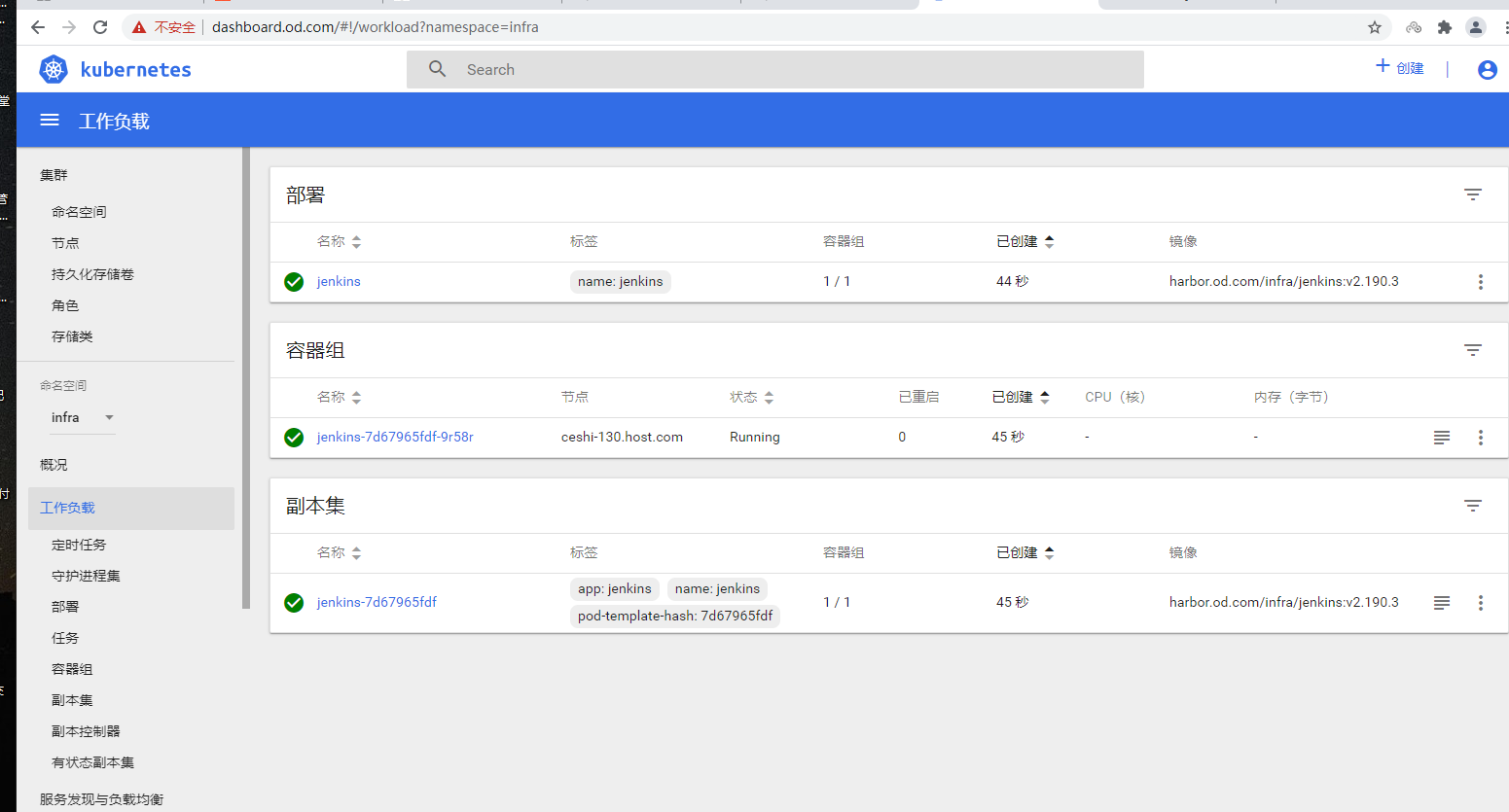
Verify pod
Node 130 131
- Before testing git, you must upload the public key to the SSH public key of Gitee security settings before image packaging (using the SSH public key allows you to use a secure connection when your computer communicates with Gitee)
[root@ceshi-130 ~]# kubectl get pod -n infra NAME READY STATUS RESTARTS AGE jenkins-698b4994c8-hm5wf 1/1 Running 0 5h21m [root@ceshi-130 ~]# kubectl exec -it jenkins-698b4994c8-hm5wf bash -n infra root@jenkins-698b4994c8-hm5wf:/# whoami root root@jenkins-698b4994c8-hm5wf:/# date Wed Aug 18 16:33:53 CST 2021 Test to ssh Connectivity root@jenkins-698b4994c8-hm5wf:/# ssh -i /root/.ssh/id_rsa -T git@gitee.com Hi Liu Jiangxu! You've successfully authenticated, but GITEE.COM does not provide shell access. test harbor Warehouse connectivity root@jenkins-698b4994c8-hm5wf:/# docker login harbor.od.com Authenticating with existing credentials... WARNING! Your password will be stored unencrypted in /root/.docker/config.json. Login Succeeded
Deploy maven
Node 132
Portal: maven:3.6.2
Configure maven
[root@ceshi-132 ~]# mkdir /data/nfsvolume/jenkins_home/maven-3.6.2-8u242
[root@ceshi-132 ~]# tar xf apache-maven-3.6.2-bin.tar.gz
[root@ceshi-132 ~]# mv apache-maven-3.6.2/* /data/nfsvolume/jenkins_home/maven-3.6.2-8u242/
[root@ceshi-132 ~]# vi /data/nfsvolume/jenkins_home/maven-3.6.2-8u242/conf/settings.xml
<mirror>
<id>nexus-aliyun</id>
<mirrorOf>*</mirrorOf>
<name>Nexus aliyun</name>
<url>http://maven.aliyun.com/nexus/content/groups/public</url>
</mirror>
Download the image required for java operation
[root@ceshi-132 ~]# docker pull stanleyws/jre8:8u112
[root@ceshi-132 ~]# docker tag fa3a085d6ef1 harbor.od.com/public/jre8:8u112
[root@ceshi-132 ~]# docker push harbor.od.com/public/jre8:8u112
The push refers to repository [harbor.od.com/public/jre8]
[root@ceshi-132 ~]# mkdir /data/dockerfile/jre8
[root@ceshi-132 jre8]# vi Dockerfile
From private warehouse
FROM harbor.od.com/public/jre8:8u112
Set time zone
RUN /bin/cp /usr/share/zoneinfo/Asia/Shanghai /etc/localtime &&\
echo 'Asia/Shanghai' >/etc/timezone
Add monitoring profile
ADD config.yml /opt/prom/config.yml
collect jvm information
ADD jmx_javaagent-0.3.1.jar /opt/prom/
working directory
WORKDIR /opt/project_dir
docker Run default startup script
ADD entrypoint.sh /entrypoint.sh
CMD ["/entrypoint.sh"]
[root@ceshi-132 jre8]# wget https://repo1.maven.org/maven2/io/prometheus/jmx/jmx_prometheus_javaagent/0.3.1/jmx_prometheus_javaagent-0.3.1.jar -O jmx_javaagent-0.3.1.jar
[root@ceshi-132 jre8]# vi config.yml
---
rules:
- pattern: '.*'
[root@ceshi-132 jre8]# vi entrypoint.sh
#!/bin/sh
M_OPTS="-Duser.timezone=Asia/Shanghai -javaagent:/opt/prom/jmx_javaagent-0.3.1.jar=$(hostname -i):${M_PORT:-"12346"}:/opt/prom/config.yml"
C_OPTS=${C_OPTS}
JAR_BALL=${JAR_BALL}
exec java -jar ${M_OPTS} ${C_OPTS} ${JAR_BALL}
structure dockerfile
[root@ceshi-132 jre8]# docker build . -t harbor.od.com/base/jre8:8u112
Successfully built 7f36e75aac28
Successfully tagged harbor.od.com/base/jre8:8u112
[root@ceshi-132 jre8]# docker push harbor.od.com/base/jre8:8u112
8d4d1ab5ff74: Mounted from public/jre8
8u112: digest: sha256:72d4bd870605ae17f9f23e5cb9c453c34906d7ff86ce97c0c2ef89b68c1dcb6f size: 2405
Download the Jenkins plug-in
Blue Ocean
Jenkins new flow project
New Item>pipeline>Configure>Discard old builds
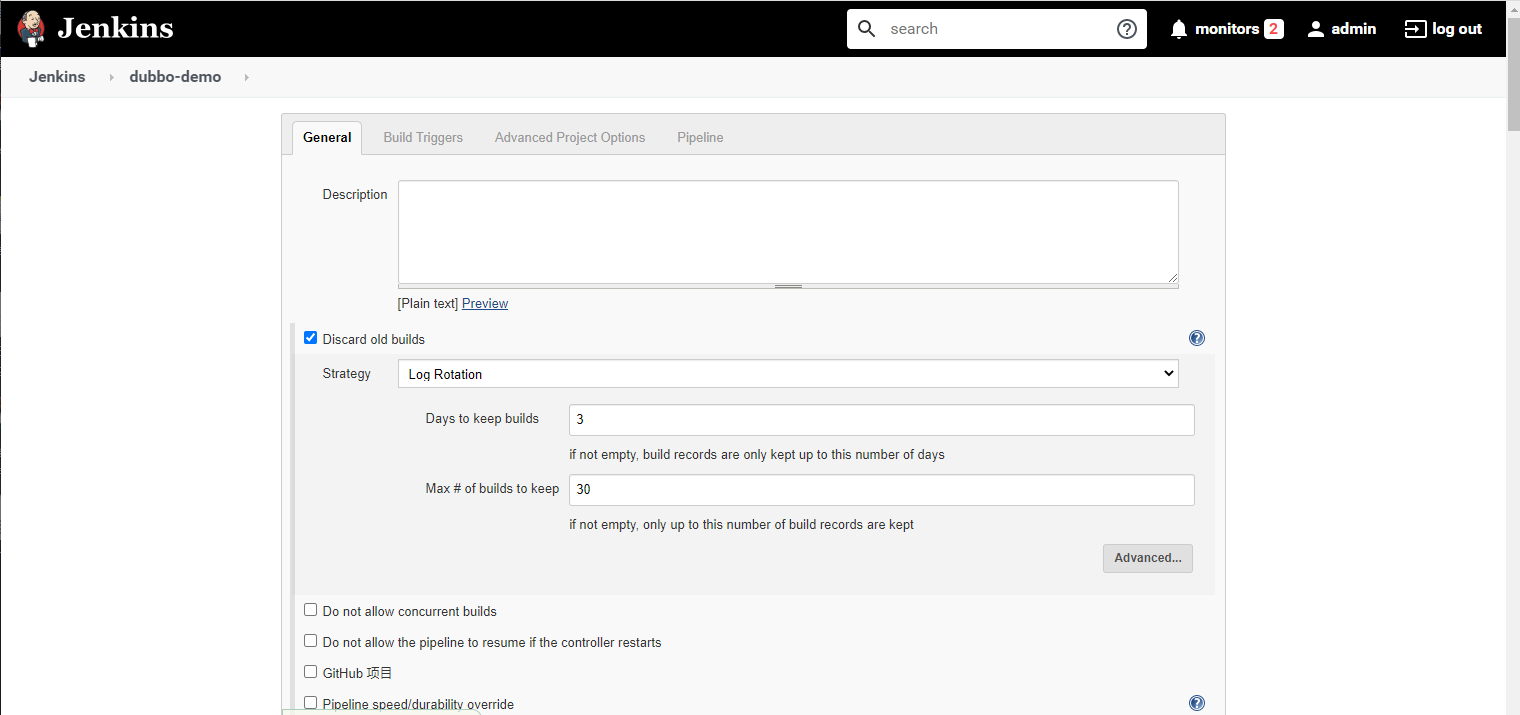
New Item>pipeline>Configure>This project is parameterized
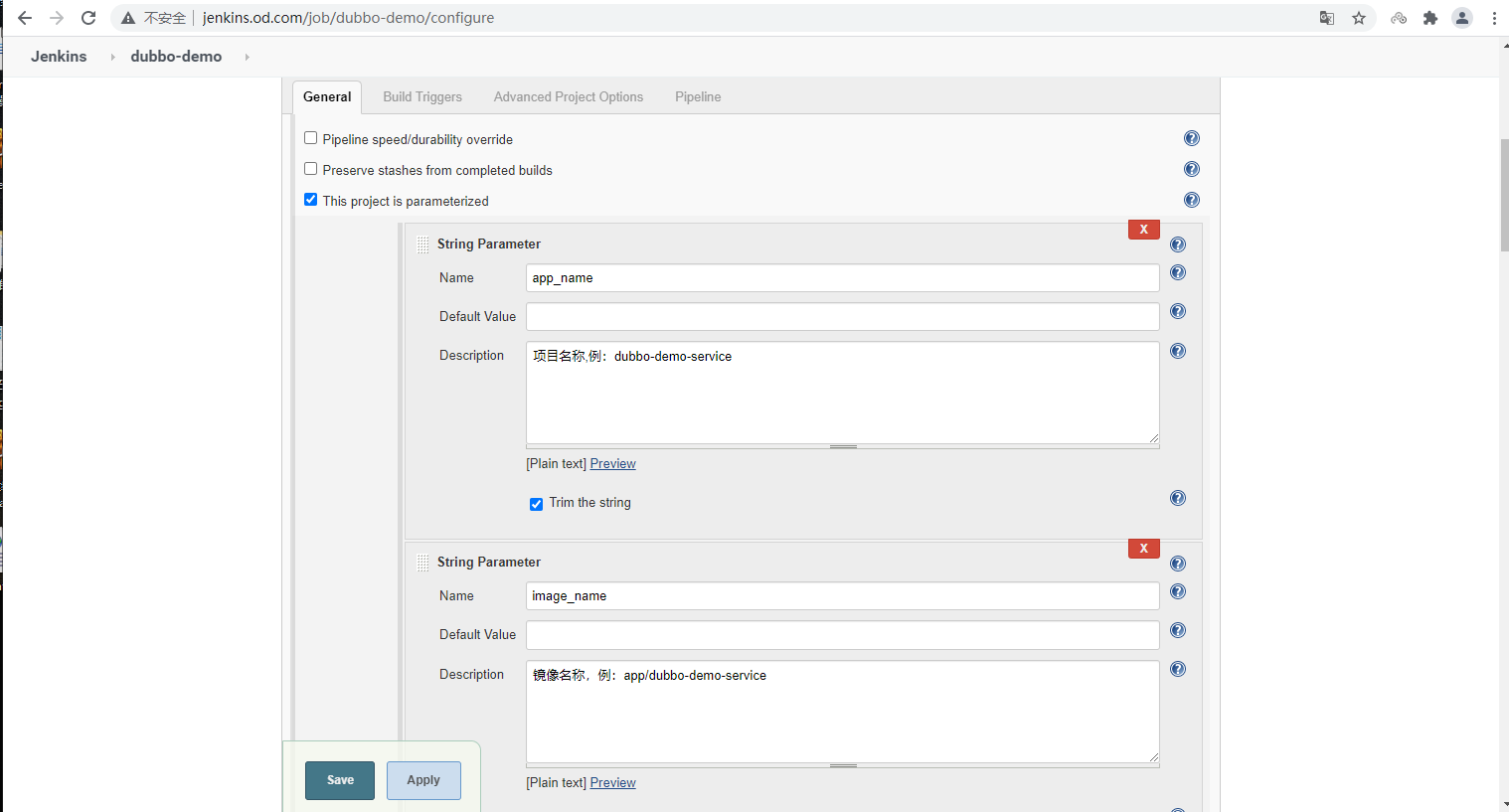
-
Add Parameter -> String Parameter
Name : app_name
Default Value :
Description: project name -
Add Parameter -> String Parameter
Name : image_name
Default Value :
Description: image name -
Add Parameter -> String Parameter
Name : git_repo
Default Value :
Description: address of git central warehouse where the project is located -
Add Parameter -> String Parameter
Name : git_ver
Default Value :
Description: the branch or version number corresponding to the project in git central warehouse -
Add Parameter -> String Parameter
Name : add_tag
Default Value :
Description: docker image label time part -
Add Parameter -> String Parameter
Name : mvn_dir
Default Value : ./
Description: compile project directory path -
Add Parameter -> String Parameter
Name : target_dir
Default Value : ./target
Description: the directory of war/jar generated after the project is compiled -
Add Parameter -> String Parameter
Name : mvn_cmd
Default Value : mvn clean package -Dmaven.test.skip=true
Description: execute the command used for compilation -
Add Parameter -> Choice Paramete
Name : base_image
Default Value :
base/jre7:7u80
base/jre8:8u112
Description: the project uses the bottom package as the image -
Add Parameter -> Choice Parameter
Name : maven
Default Value :
3.6.0-8u181
3.2.5-6u025
Description: perform compilation using maven software version
Pipeline>
pipeline {
agent any
stages {
stage('pull') { //get project code from repo
steps {
sh "git clone ${params.git_repo} ${params.app_name}/${env.BUILD_NUMBER} && cd ${params.app_name}/${env.BUILD_NUMBER} && git checkout ${params.git_ver}"
}
}
stage('build') { //exec mvn cmd
steps {
sh "cd ${params.app_name}/${env.BUILD_NUMBER} && /var/jenkins_home/maven-${params.maven}/bin/${params.mvn_cmd}"
}
}
stage('package') { //move jar file into project_dir
steps {
sh "cd ${params.app_name}/${env.BUILD_NUMBER} && cd ${params.target_dir} && mkdir project_dir && mv *.jar ./project_dir"
}
}
stage('image') { //build image and push to registry
steps {
writeFile file: "${params.app_name}/${env.BUILD_NUMBER}/Dockerfile", text: """FROM harbor.od.com/${params.base_image}
ADD ${params.target_dir}/project_dir /opt/project_dir"""
sh "cd ${params.app_name}/${env.BUILD_NUMBER} && docker build -t harbor.od.com/${params.image_name}:${params.git_ver}_${params.add_tag} . && docker push harbor.od.com/${params.image_name}:${params.git_ver}_${params.add_tag}"
}
}
}
}
Build project
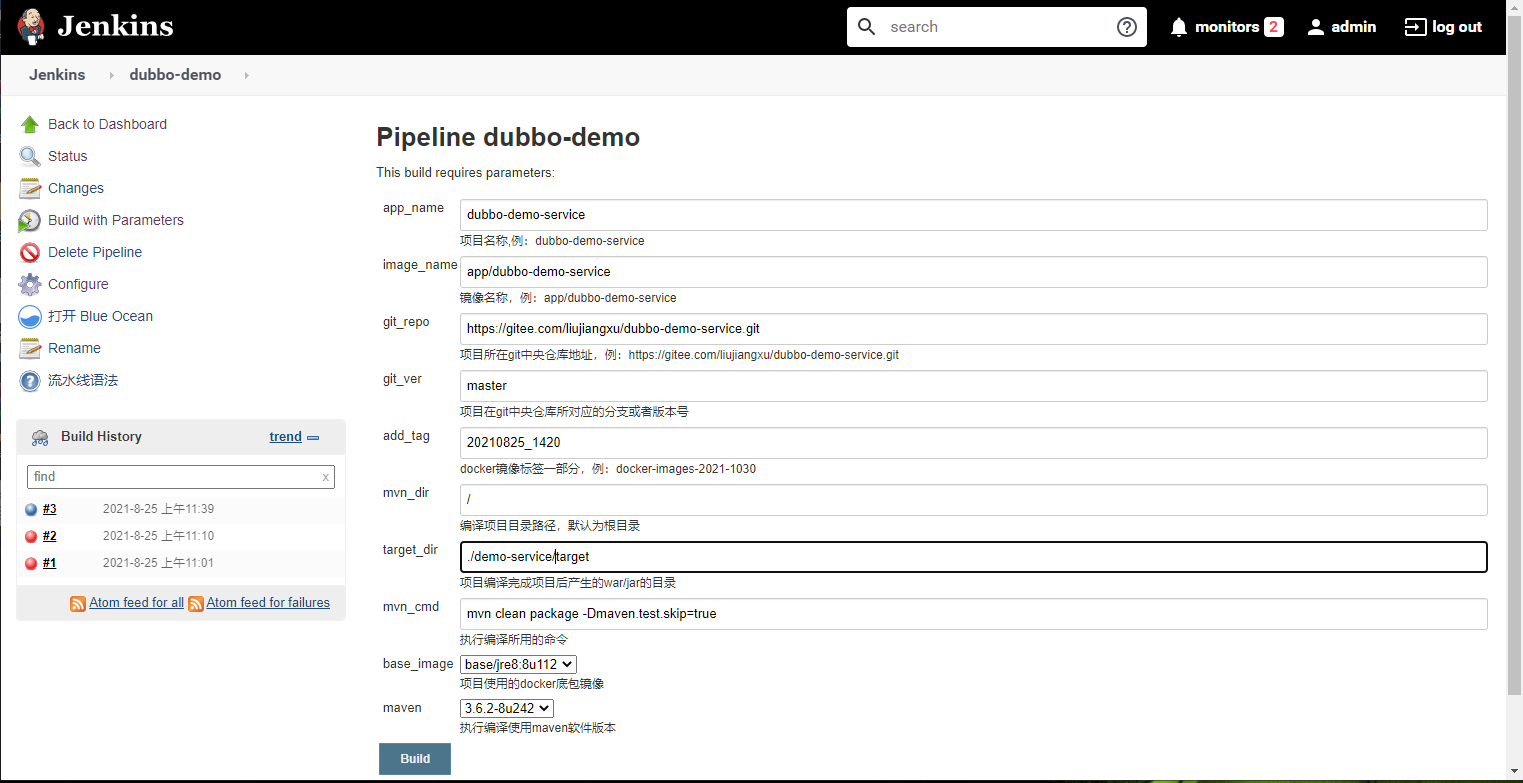
Edit resource configuration list
Node 132
[root@ceshi-132 ~]# cd /data/k8s-yaml/
[root@ceshi-132 k8s-yaml]# mkdir dubbo-demo-service
[root@ceshi-132 k8s-yaml]# cd dubbo-demo-service/
[root@ceshi-132 dubbo-demo-service]# vi dp.yaml
kind: Deployment Define the resource category. To create POD Just write as pod,Deployment,StatefulSet etc.
apiVersion: extensions/v1beta1 Define version
metadata: Metadata information, including resource name namespace Wait. namespace Used to classify resources. There will be one by default default Namespace
name: dubbo-demo-service name
namespace: app Namespace
labels: label
name: dubbo-demo-service name
spec: Declare the attribute state of the resource, that is, you want to deployment What is it like
replicas: 1 Number of copies
selector: Controller selector, which specifies the controller to manage those pod
matchLabels: labels Matching rules
name: dubbo-demo-service name
template: Template. When the number of copies is insufficient, create according to the following template pod copy
metadata: metadata
labels: label
app: dubbo-demo-service Label yourself
name: dubbo-demo-service name
spec: Declare the attribute state of the resource, that is, you want to deployment What is it like
containers: Create container
- name: dubbo-demo-service name
image: harbor.od.com/app/dubbo-demo-service:master_20210825_1139 Mirror Address
ports: port settings
- containerPort: 20880 Exposed 20880 port
protocol: TCP agreement
env: set variable
- name: JAR_BALL JAR_BALL=dubbo-server.jar
value: dubbo-server.jar
imagePullPolicy: IfNotPresent Give priority to local image,No more local Downloads
imagePullSecrets: Reference creation secrets,Private warehouse must add this parameter
- name: harbor Created at that time secret Name when
restartPolicy: Always Restart policy when container stops running
terminationGracePeriodSeconds: 30 wait for pod The buffer duration is 30 seconds by default, such as when you start pod Not in more than 30 seconds running Will be forced to end. This value is based on the actual business
securityContext: All processes in the container UserID 0 Run as
runAsUser: 0 root Mode start
schedulerName: default-scheduler Scheduling operation node: default scheduling method
strategy: Will existing pod Replace with new pod Deployment strategy for
type: RollingUpdate Rolling update configuration parameters, only if the type is RollingUpdate
rollingUpdate:
maxUnavailable: 1 And expectations ready Proportion of copies
maxSurge: 1 Maximum generated by rolling update process pod quantity
revisionHistoryLimit: 7 Defines the number of upgrade records to keep
progressDeadlineSeconds: 600 The maximum time for rolling upgrade is 600 seconds
kubectl Add namespace [root@ceshi-130 ~]# kubectl create namespace app namespace/app created kubectl Authorize private warehouse image pull permission [root@ceshi-130 ~]# kubectl create secret docker-registry harbor --docker-server=harbor.od.com --docker-username=admin --docker-password=12345 -n app secret/harbor created [root@ceshi-130 ~]# kubectl apply -f http://k8s-yaml.od.com/dubbo-demo-service/dp.yaml deployment.extensions/dubbo-demo-service created
Dubbo monitor tool
Portal: dubbo-monitor-master
Node 132
[root@ceshi-132 ~]# unzip dubbo-monitor-master.zip [root@ceshi-132 conf]# vi /root/dubbo-monitor/dubbo-monitor-simple/conf/dubbo_origin.properties dubbo.container=log4j,spring,registry,jetty dubbo.application.name=simple-monitor dubbo.application.owner=liujiangxu dubbo.registry.address=zookeeper://zk1.od.com:2181?backup=zk2.od.com:2181,zk3.od.com:2181 dubbo.protocol.port=20880 dubbo.jetty.port=8080 dubbo.jetty.directory=/dubbo-monitor-simple/monitor dubbo.charts.directory=/dubbo-monitor-simple/charts dubbo.statistics.directory=/dubbo-monitor-simple/statistics dubbo.log4j.file=logs/dubbo-monitor-simple.log dubbo.log4j.level=WARN structure dockerfile [root@ceshi-132 ~]# cp -a dubbo-monitor /data/dockerfile/ [root@ceshi-132 ~]# cd /data/dockerfile/dubbo-monitor [root@ceshi-132 dubbo-monitor]# docker build . -t harbor.od.com/infra/dubbo-monitor:latest [root@ceshi-132 dubbo-monitor]# docker push harbor.od.com/infra/dubbo-monitor:latest
Delivery k8s configuration resource list
[root@ceshi-132 dubbo-monitor]# cat dp.yaml
kind: Deployment
apiVersion: extensions/v1beta1
metadata:
name: dubbo-monitor
namespace: infra
labels:
name: dubbo-monitor
spec:
replicas: 1
selector:
matchLabels:
name: dubbo-monitor
template:
metadata:
labels:
app: dubbo-monitor
name: dubbo-monitor
spec:
containers:
- name: dubbo-monitor
image: harbor.od.com/infra/dubbo-monitor:latest
ports:
- containerPort: 8080
protocol: TCP
- containerPort: 20880
protocol: TCP
imagePullPolicy: IfNotPresent
imagePullSecrets:
- name: harbor
restartPolicy: Always
terminationGracePeriodSeconds: 30
securityContext:
runAsUser: 0
schedulerName: default-scheduler
strategy:
type: RollingUpdate
rollingUpdate:
maxUnavailable: 1
maxSurge: 1
revisionHistoryLimit: 7
progressDeadlineSeconds: 600
[root@ceshi-132 dubbo-monitor]# cat svc.yaml
kind: Service
apiVersion: v1
metadata:
name: dubbo-monitor
namespace: infra
spec:
ports:
- protocol: TCP
port: 8080 Cluster network port (cluster) ip There is only one service, which can be configured randomly according to the port)
targetPort: 8080 Port in container
selector:
app: dubbo-monitor
[root@ceshi-132 dubbo-monitor]# cat ingress.yaml
kind: Ingress
apiVersion: extensions/v1beta1
metadata:
name: dubbo-monitor
namespace: infra
spec:
rules:
- host: dubbo-monitor.od.com
http:
paths:
- path: /
backend:
serviceName: dubbo-monitor
servicePort: 8080 corresponding service.yaml in port port configuration
DNS resolves the host domain name in the ingress configuration
[root@ceshi-130 ~]# kubectl apply -f http://k8s-yaml.od.com/dubbo-monitor/dp.yaml deployment.extensions/dubbo-monitor created [root@ceshi-130 ~]# kubectl apply -f http://k8s-yaml.od.com/dubbo-monitor/svc.yaml service/dubbo-monitor created [root@ceshi-130 ~]# kubectl apply -f http://k8s-yaml.od.com/dubbo-monitor/ingress.yaml ingress.extensions/dubbo-monitor created [root@ceshi-130 ~]# kubectl get pods -n infra -o wide NAME READY STATUS RESTARTS AGE IP NODE NOMINATED NODE READINESS GATES dubbo-monitor-5bb45c8b97-fnwt7 1/1 Running 0 6m59s 172.7.21.9 ceshi-130.host.com <none> <none> jenkins-698b4994c8-hm5wf 1/1 Running 0 7d6h 172.7.22.9 ceshi-131.host.com <none> <none>
Delivering dubbo services to consumers
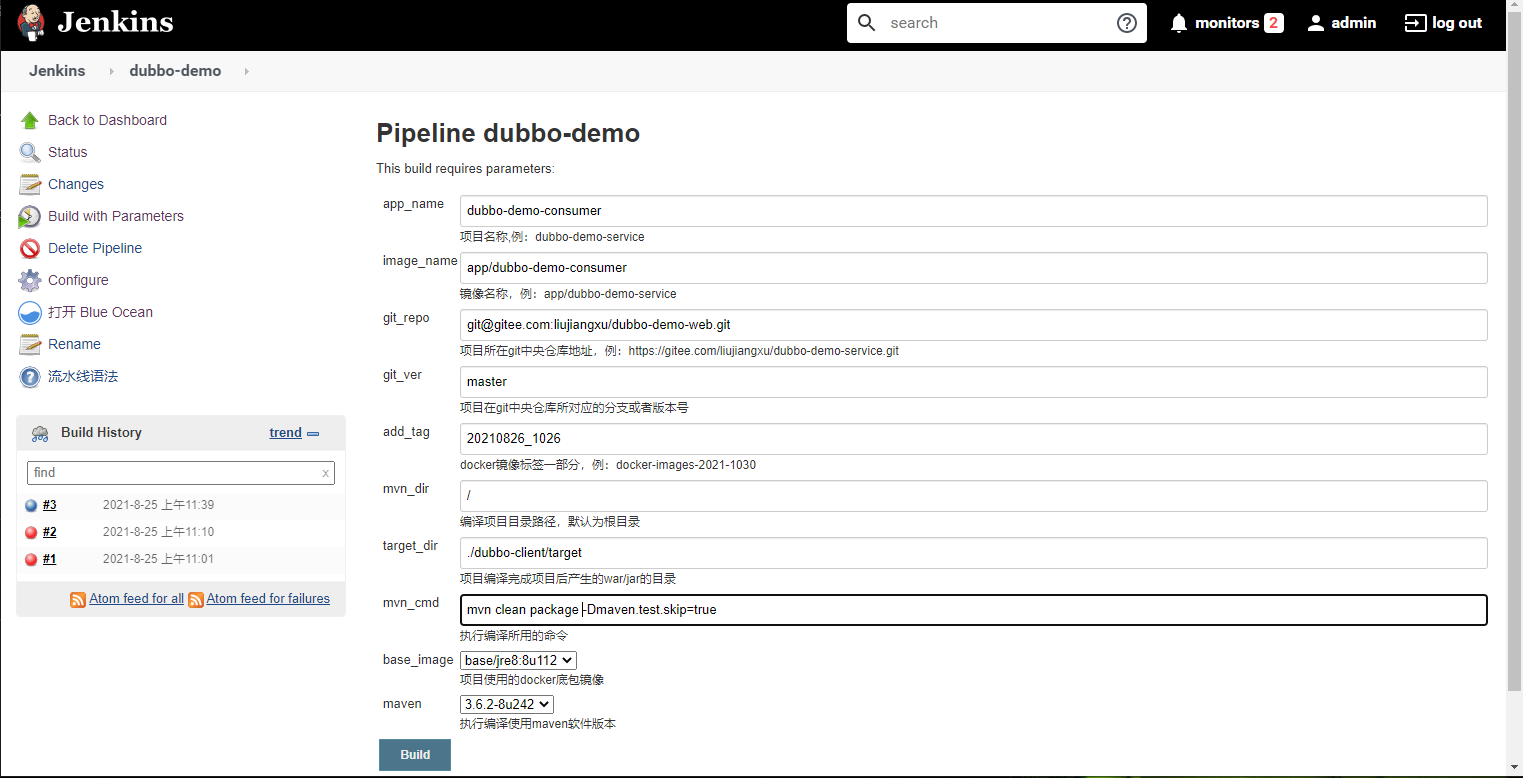
Edit resource configuration list
Node 132
[root@ceshi-132 ~]# cd /data/k8s-yaml/
[root@ceshi-132 k8s-yaml]# mkdir dubbo-demo-web
[root@ceshi-132 k8s-yaml]# cd dubbo-demo-web/
[root@ceshi-132 dubbo-demo-web]# vi dp.yaml
kind: Deployment Define the resource category. To create POD Just write as pod,Deployment,StatefulSet etc.
apiVersion: extensions/v1beta1 Define version
metadata: Metadata information, including resource name namespace Wait. namespace Used to classify resources. There will be one by default default Namespace
name: dubbo-demo-consumer name
namespace: app Namespace
labels: label
name: dubbo-demo-consumer name
spec: Declare the attribute state of the resource, that is, you want to deployment What is it like
replicas: 1 Number of copies
selector: Controller selector, which specifies the controller to manage those pod
matchLabels: labels Matching rules
name: dubbo-demo-consumer name
template: Template. When the number of copies is insufficient, create according to the following template pod copy
metadata: metadata
labels: label
app: dubbo-demo-consumer Label yourself
name: dubbo-demo-consumer name
spec: Declare the attribute state of the resource, that is, you want to deployment What is it like
containers: Create container
- name: dubbo-demo-consumer name
image: harbor.od.com/app/dubbo-demo-consumer:master_20210826_1040 Mirror Address
ports: port settings
- containerPort: 8080
protocol: TCP
- containerPort: 20880
protocol: TCP
env: set variable
- name: JAR_BALL JAR_BALL=dubbo-client.jar
value: dubbo-client.jar
imagePullPolicy: IfNotPresent Give priority to local image,No more local Downloads
imagePullSecrets: Reference creation secrets,Private warehouse must add this parameter
- name: harbor Created at that time secret Name when
restartPolicy: Always Restart policy when container stops running
terminationGracePeriodSeconds: 30 wait for pod The buffer duration is 30 seconds by default, such as when you start pod Not in more than 30 seconds running Will be forced to end. This value is based on the actual business
securityContext: All processes in the container UserID 0 Run as
runAsUser: 0 root Mode start
schedulerName: default-scheduler Scheduling operation node: default scheduling method
strategy: Will existing pod Replace with new pod Deployment strategy for
type: RollingUpdate Rolling update configuration parameters, only if the type is RollingUpdate
rollingUpdate:
maxUnavailable: 1 And expectations ready Proportion of copies
maxSurge: 1 Maximum generated by rolling update process pod quantity
revisionHistoryLimit: 7 Defines the number of upgrade records to keep
progressDeadlineSeconds: 600 The maximum time for rolling upgrade is 600 seconds
[root@ceshi-132 dubbo-demo-web]# vi svc.yaml
kind: Service
apiVersion: v1
metadata:
name: dubbo-demo-consumer
namespace: app
spec:
ports:
- protocol: TCP
port: 8080
targetPort: 8080
selector:
app: dubbo-demo-consumer
[root@ceshi-132 dubbo-demo-web]# vi ingress.yaml
kind: Ingress
apiVersion: extensions/v1beta1
metadata:
name: dubbo-demo-consumer
namespace: app
spec:
rules:
- host: demo.od.com
http:
paths:
- path: /
backend:
serviceName: dubbo-demo-consumer
servicePort: 8080
[root@ceshi-130 ~]# kubectl apply -f http://k8s-yaml.od.com/dubbo-demo-web/dp.yaml deployment.extensions/dubbo-demo-consumer created [root@ceshi-130 ~]# kubectl apply -f http://k8s-yaml.od.com/dubbo-demo-web/svc.yaml service/dubbo-demo-consumer created [root@ceshi-130 ~]# kubectl apply -f http://k8s-yaml.od.com/dubbo-demo-web/ingress.yaml ingress.extensions/dubbo-demo-consumer created